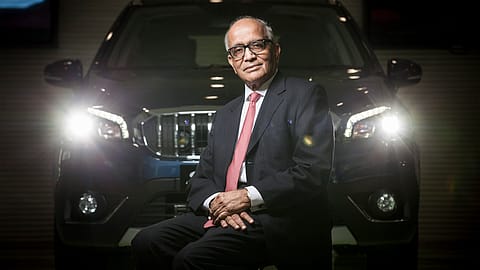Suzuki working on low-cost hybrid tech: Maruti chairman RC Bhargava
While hybrids outsold electric vehicles in the last six months of the financial year 2023-24, they accounted for just 2.1% of total car sales.

Japanese carmaker Suzuki Motor Corporation is working on low-cost hybrid technology that may enable smaller affordable cars to better their fuel economy.
Maruti Suzuki currently sells only two hybrid cars — sport utility vehicle Grand Vitara and multi-purpose vehicle Invicto — both sourced from Suzuki's partnership with Toyota.
The cost of the technology that goes into making Toyota hybrids is still quite high and that's why the cost of the car becomes high, says RC Bhargava, chairman of Maruti Suzuki India Ltd.
"A lot of work is going on, particularly in Suzuki Japan, on evolving a better technology which will enable smaller cars to take advantage of the principles of hybridisation to improve fuel economy at a much more affordable cost. If that is aligned with a lower GST (Goods and Services Tax) also, you can look forward to small cars with much better mileage than what they have today," Bhargava says.
But it all depends on the GST rate and how quickly and effectively Suzuki Japan and the engineers there are able to develop a robust technology, the Maruti Suzuki chairman says, adding that this tech is not there at the moment. Suzuki Motor Corporation owns 58.19% stake in Maruti Suzuki.
While hybrids outsold electric vehicles in the last six months of the financial year 2023-24, they accounted for just 2.1% of total car sales compared with 2.3% EV penetration. Upfront costs for both hybrids and EVs still remain high.
"The market for hybrids to an extent is determined by the price of the hybrids. And today the duty of hybrids is 43% irrespective of anything," says Bhargava. In comparison, EVs attract 5% GST.
Recommended Stories
"It makes a huge difference whether the hybrid GST remains at 43% or whether it comes down to 12%," says Bhargava. Minister of road transport and highways minister Nitin Gadkari recently said there is a proposal with the finance ministry to slash GST on hybrid vehicles to 5%.
Out of 89,000-odd hybrids sold in the country last fiscal, Maruti Suzuki despatched around 16,800 cars. By 2030, Maruti expects hybrids to account for 25% of its total sales.
On bringing plug-in hybrids to India, Maruti Suzuki MD & CEO Hisashi Takeuchi says there are no immediate plans currently but the automaker may consider it going forward.
The carmaker plans to start production of its first electric vehicle, the eVX, during the ongoing fiscal. It is eyeing 15% EV penetration by the end of the decade whereas the government targets 30% of all new-car sales to be EVs. Rival Tata Motors, which sold over 64,000 electric cars last fiscal, is eyeing 50% EV penetration by 2030.
(INR CR)
Maruti Suzuki remains the top carmaker in India, cornering a mammoth 42% market share. Out of 41.29 lakh cars that rolled off dealers' lots in FY24, 17.93 lakh came from Maruti Suzuki. Six of the top 10 car models were sold by India's largest carmaker in FY24. The automaker crossed the 2 million sales mark including exports and sales to other OEMs.
Despite the high base of last year, Maruti is aiming for close to double-digit growth in FY25, says Bhargava. "Inflation is going to be under control in 2024-25 and that will possibly lead to a reduction in interest rates in the second half of the year. If that happens, that will give a further boost to car demand," he says.